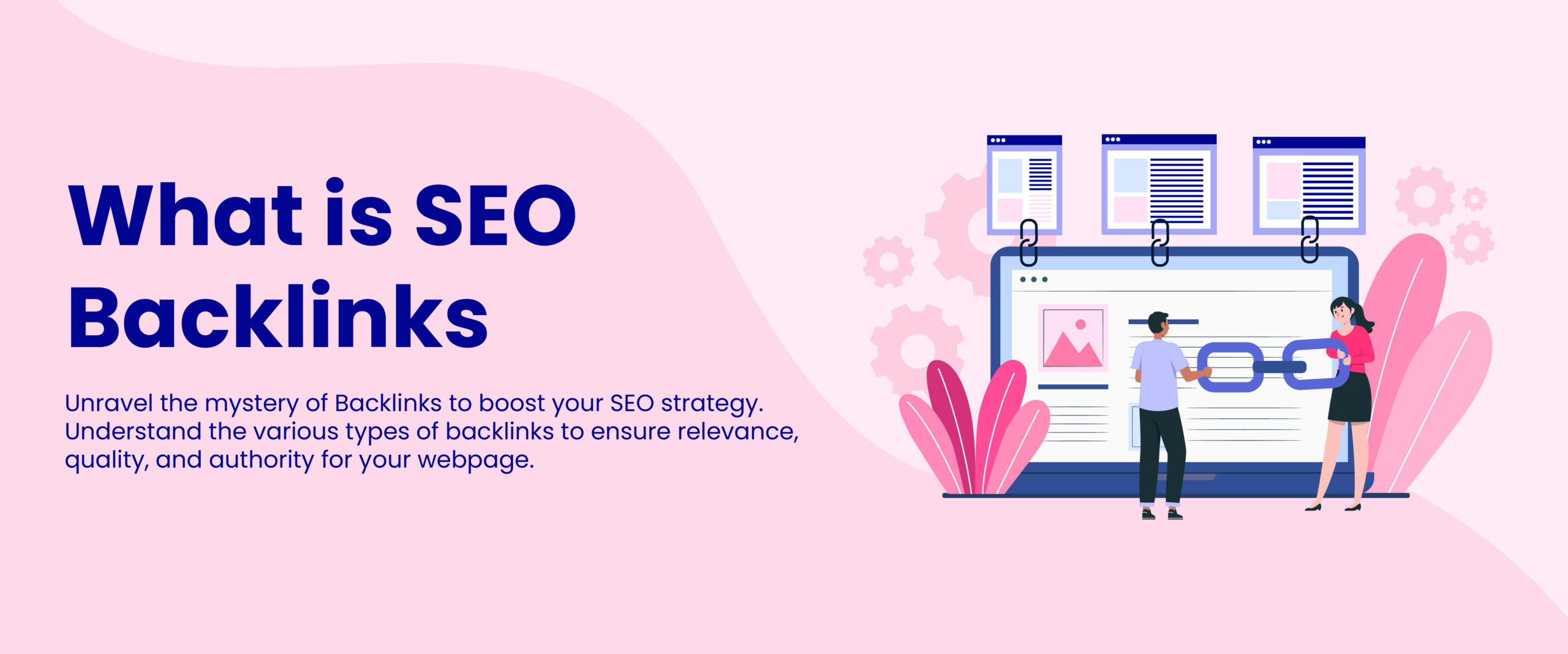What are SEO Backlinks? – Types, How to Build Backlinks, & More
Did you know more than 66% of pages have zero backlinks pointing to them? Search Engine Optimization (SEO) is a necessity for any website wanting to be found online. One important aspect of SEO is backlinks, which are links from other websites pointing to your site. SEO Backlinks play an important role in improving your website’s ranking in SERPs, as well as helping potential customers find you more easily. It is essential that businesses understand why backlinks are important when it comes to their online presence and how they can use them strategically in order to improve their rankings on SERPs.
What are Backlinks?
Backlinks are inbound links that lead from one website to another. They are essential for search engine optimization (SEO) and figuring out the authority and credibility of a website. Search engines view backlinks from reliable sites as a sign of high-quality content and relevancy when they appear on a page. The quantity and quality of backlinks have an effect on a website’s visibility and ranking in organic search results. More high-quality backlinks increase the likelihood that a website will appear higher in search engine results pages (SERPs).
Clear all the concepts of SEO and get placed with our digital marketing course with placement guarantee.
Types of Backlinks
To understand what backlinks are in SEO examples better, here are some of the different types of backlinks that are available:
1. Do-Follow Backlinks
These are the links that search engines will follow and count toward your website’s ranking. They can be obtained by creating content or actively participating in conversations on blogs, forums, and other websites where you can leave a link to your site. Do-follow backlinks are the most valuable type of backlink for SEO purposes since they help build credibility with search engines.
2. No-Follow Backlinks
They don’t pass any “link juice” to the linked page and won’t increase their rankings on SERPs. They still offer value in terms of increasing traffic but should not be relied upon as much when trying to improve rankings within search engine algorithms. These types of links often come from social media sites such as Twitter, Facebook, Pinterest, etc., which all use no-follow attributes on their external links.
3. Natural Backlinks
These occur organically when webmasters and bloggers discover content they find interesting and choose to link it without being asked or paid for doing so. This is one form of earning authority online by providing useful information that others want to reference and share with their own audiences. this ultimately benefits both parties involved as well as improving organic reach overall.
4. Manual Backlinks
Involve creating relationships with other websites owners who agree to post hyperlinked references about each other’s products/services/brands in exchange for reciprocal exposure opportunities (i.e., linking directly from one website owner’s blog post about a certain topic onto another website owner’s corresponding blog post regarding that same topic). Manual Backlinks take time but have the potential benefit of providing highly targeted referral traffic if done correctly—especially if both partners make sure their respective target markets.
To understand the meaning of backlinks, you can pursue a digital marketing course.
Best Practices for Backlinks
Some of the best practices that can be followed while creating backlinks are:
1. Researching Your Link
It is an important part of link-building.
- Before you start any backlink campaign, take the time to research relevant websites and blogs related to your niche.
- Make sure that they are reputable and have content that will be of value to your readers. It’s also a good idea to look at their existing backlinks and see what kind of success other companies within your industry have had working with them.
2. Monitoring and Updating Links
It is essential for maintaining successful link-building campaigns over time.
- Regularly check all of the links pointing to your website, as well as those pointing from it, so that you can make sure they are still active and not leading visitors down a dead-end path.
- If necessary, replace broken or outdated backlinks with new ones from authoritative sources in order to ensure visitors can find what they’re looking for.
3. Focusing On Quality
It should always be one of the top priorities when it comes to building backlinks for SEO purposes.
- High-quality websites tend to rank higher in SERPs than low-quality sites.
- so aim for obtaining backlinks from trusted sources such as industry leaders or influencers who produce valuable content regularly.
4. Patience
It is the key to successful backlinks.
- When it comes to effective link-building strategies since results don’t usually happen overnight—so don’t expect immediate success.
- Building relationships with other websites takes time but typically pays off if done correctly; simply getting tons of random links without doing research won’t do much good in terms of helping improve SEO rankings.
How To Build Backlinks?
Some of the ways in which you can build backlinks are:
1. Blog Commenting
It is a great way to build backlinks for SEO purposes. By leaving thoughtful comments on relevant blog posts, you can establish yourself as an expert in your field and start gaining more visibility within your industry. Make sure that the blog post you’re commenting on is related to your niche so that readers will be interested in what you have to say.
2. Directory Submission
It is another effective way of building quality links since submitting websites to online directories creates opportunities for increased exposure and visibility across search engine results pages (SERPs). When submitting a website, it’s important to choose appropriate categories based on the content being offered; this helps ensure that potential customers are able to find exactly what they’re looking for when searching online.
3. Forum Participation
This offers yet another opportunity for link-building success. Participating in conversations within forums where discussions are centered around topics related directly or indirectly to one’s niche provides chances not only of increasing brand awareness but also to get direct traffic from visitors who follow any given thread and come across those references made about one’s company or products/services.
4. Guest Posting
This involves writing articles that are posted on other people’s blogs in exchange for a link pointing back at yours. This type of link-building strategy works well because it allows you access to different audiences while still maintaining control over how much content gets published about your business as well as having full ownership over any link generated via guest posting activities.


Common Backlink Mistakes
Let’s look at some of the common mistakes made during the building of backlinks:
1. Buying Links
This involves paying other websites to include a link pointing to your own website as part of their content in exchange for money or something else of value. Not only does this practice go against search engine guidelines, but it can also negatively impact your ranking if caught by Google’s algorithms. These can just appear forced and spammy.
2. Focusing on Quantity Over Quality
While having more backlinks than competitors can often lead to higher rankings within SERPs, it won’t do much good if those links aren’t coming from reputable sources with relevant content related to your niche—or worse yet, from sites flagged as link farms/bad neighborhoods by Google’s algorithm which could cause penalties instead.
3. Link Farming/Bad Neighbourhood
This involves submitting an excessive amount of low-quality external links onto one page, while bad neighborhoods involve linking out directly from pages known for hosting malicious code such as viruses and malware. Both practices should be avoided regardless since they put visitors’ safety at risk while risking potential penalties/deindexing from search engines like Google which frown upon such activities strongly.
Conclusion
SEO backlinks are an important part of any SEO campaign and should be continually monitored and updated in order to ensure they remain effective. Quality matters more than quantity when it comes to link-building, so focus on getting high-quality links from reputable sources that are related to the content being offered by your website.







